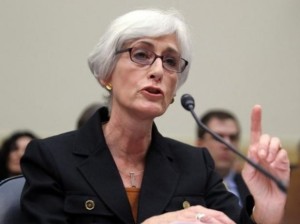October 11-13
The State Department says it is willing to lift some small sanctions but only after Iran takes concrete actions on its nuclear program and not based on any Iranian offers to discuss topics.

Even then, the State Department says, it won’t lift the really punishing sanctions until Iran has not only signed but also delivered on an agreement to restrict its nuclear program.
Meanwhile, the sanctions have gotten swept up in the angry exchanges in Washington over the federal government shutdown.
As part of the Obama Administration effort to show the damage done by the shutdown, the White House implied that sanctions enforcement had been gutted, saying that the Treasury department’s Office of Foreign Assets Control (OFAC), which writes and oversees the sanctions rules, had been cut to 11 employees from its normal 175.
But House Foreign Affairs Committee Chairman Edward Royce, Republican of California, just turned that around and accused Treasury Secretary Jack Lew of needlessly furloughing all those staffers and thus threatening “to severely undermine the effectiveness of our bipartisan and essential Iran sanctions policy.”
Actually both were exaggerating. The enforcement of the sanctions—that is, the policing of ports to check if banned goods are being exported and the investigation of suspected sanctions violations—are handled by Immigration and Customs Enforcement (ICE), whose agents are exempt from the shutdown. So enforcement continues unabated.
OFAC is largely closed, but it only writes sanctions regulations and issues designations of people in Iran and elsewhere abroad as violators. It has no police functions.
Congress is unaffected by the shutdown and the Senate has before it a new sanctions bill passed last month by the House. There were mixed signals from the Senate last week over the prospects for that bill. Some news reports said the Senate would hold off on the bill for now and others said the Senate would move forward.
Reading between the lines, it appeared that the Senate Foreign Relations Committee would wait until after the October 15-16 meeting of the Big Six with Iran in Geneva before deciding what to do. If that meeting produces something concrete, the Senate committee is likely to sit on the bill. But if the meeting produces nothing but words, the senators will likely line up to castigate Iran and move the bill forward.
Under Secretary of State Wendy Sherman, who is the US official who has met Iran at the past several sessions of the talks, was surprisingly blunt. She said the Obama Administration would support more sanctions if the October 15-16 talks did not see concrete proposals from Iran.
“I’m saying this,” Sherman told the Senate Foreign Relations Committee last week. “Come on the 15th of October with concrete, substantive actions that you will take, commitments you will make in a verifiable way, monitoring and verification that you will sign up to, to create some faith that there is reality to this, and our Congress will listen. But I can assure you, if you do not come … with that substantive plan that is real and verifiable, our Congress will take action and we will support them to do so.”
She also said she wanted to see Iran “address core issues, including but not limited to, the pace and scope of its enrichment program, the transparency of the overall nuclear program and stockpiles of enriched uranium.”
She acknowledged that Tehran would want sanctions relief, but said Washington was not prepared to go far until Iran had gone beyond words to concrete action.
“There may be some elements that we can do initially,” she said about sanctions removal. But she said Washington would only lift sanctions now that it could easily re-impose if Iran backtracked. And she said Washington would not intially lift any provisions that “go to any of the key sanctions that have brought them to the table.”
